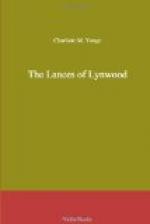Nearly a year had passed since Eustace had left England, and his situation continued unchanged. Perhaps the Prince regarded him with additional displeasure, since news had arrived that Sir Richard Ferrars had made application to the Duke of Lancaster to interest the King in the cause of the guardianship; for there was, at this time, a strong jealousy, in the mind of the Prince, of the mighty power and influence of John of Gaunt, which he already feared might be used to the disadvantage of his young sons.
The cause was, at length, decided, and a letter from good Father Cyril conveyed to Eustace the intelligence that the Chancellor, William of Wykeham, Bishop of Winchester, having given due weight to Sir Reginald’s dying words and Lady Lynwood’s testament, had pronounced Sir Eustace Lynwood the sole guardian of the person and estate of his nephew, and authorized all the arrangements he had made on his departure.
Affairs altogether began to wear a brighter aspect. The first indignation against Sir Eustace had subsided, and he was treated, in general, with indifference rather than marked scorn. The gallant old Chandos was again on better terms with the Prince, and, coming to Bordeaux, made two or three expeditions, in which Eustace volunteered to join, and gained some favourable, though slight, notice from the old Knight. Fulk Clarenham, too, having received from the Prince the government of Perigord, was seldom at court, and no active enemy appeared to be at work against him.
Agnes de Clarenham, always retiring and pensive, and seldom sought out by those who admired gayer damsels, was sitting apart in the embrasure of a window, whence, through an opening in the trees of the garden, she could catch a distant glimpse of the blue waters of the river where it joined the sea, which separated her from her native land, and from her who had ever been as a mother to her. She was so lost in




